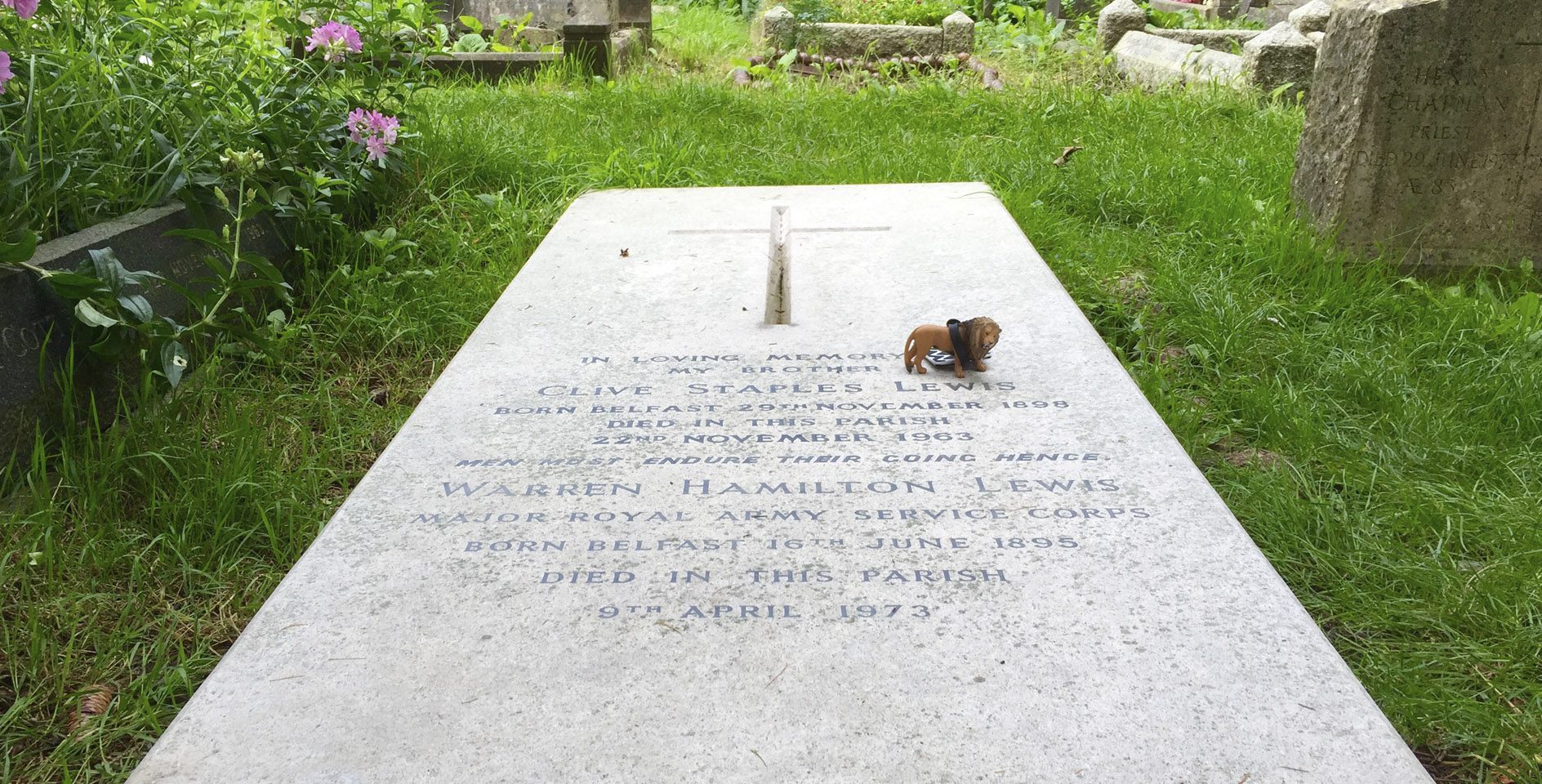Kings and queens. Castles and crowns. Monarchs and majesties. A journey through the United Kingdom’s storied history is one rich in royal blood. To travel her winding roads by book is insightful. Yet to trod those well-worn paths in bodily experience is uniquely transformational.
What I encountered on a recent trip far surpassed everything chroniclers had helped me to imagine. Not merely a kingdom conquered by a soldier’s sword and kept by a sovereign’s scepter. Nor one flowing only from the English Channel to north of the Isle of Man. I experienced the kingdom of God.
And I found it in a graveyard.
This was a solo journey, a welcome respite from the Washington routine. Sure, I met many friendly locals and fellow travelers along the way. And I quickly learned how to drive on the left side of the road, from the right side of the car, while left-hand shifting a six-speed gearbox. But I found company, too, in rather unexpected places. Not in entry lines and eateries, nor over tea and scones, but instead in sand and stone, in marble and monument.
The first cemetery was hidden and hard to find. Homes populated the perimeter, and overgrown shrubs canvassed the weathered walls. I had been just steps away from the burial grounds’ latched gate—even passing it several times—unaware.
Five minutes at the foot of G.K. Chesterton’s modest marker would suffice. Stones, everyone knows, don’t speak. Only the rustle of leaves in the crisp autumn breeze broke the solitary silence. No gallery of gawkers or teary-eyed mourners to contend with. No Stonehenge charters on stopover to snap selfies beside a stone etched “Chesterton,” either. Not that I expected any.
This was, after all, a plot of earth reserved for the bones of a writer and thinker of the Christian tradition—a man who set voyage into eternity just days after the Queen Mary first made hers across the Atlantic. Eighty years later, people move on. Other ships sail.
Something, though, about the stillness stayed with me. And so it was a day later, in a church graveyard on the outskirts of Oxford.
A Lion ‘on the move’
C.S. Lewis rests, in the minds of many, in larger memory than Chesterton. Even so, the November 22, 1963, death of the author and professor affectionately known as “Jack” remains hidden, it seems, in the shadow of the same-day death of another Jack—John F. Kennedy.
But as I stood in mid-day quietness at the grave of England’s Jack—himself no president or king, just United Kingdom-born—others, I detected, had ventured by. A lion figurine atop the flat cut of stone distinguished Lewis’ from the others. Uniquely set apart, I reflected. The man who guided untold masses to Mere Christianity and led many through the enchanted land of Narnia had himself traveled on, into that otherworldly wardrobe.
Yet Aslan, reassuringly, stood watch—still, as Lewis would say, “on the move.” I reflected beyond Lewis’ stone to the Living Stone (1 Pet. 2:4). Struck with awe and wonder, I felt, at once, like Narnia’s storybook Pevensie children in the presence of an otherworldly lion: both “glad and quiet[,] and it didn’t seem awkward” for me “to stand and say nothing.”
And in the stillness, atop the stone, amid a rising sun, came forth a sound, inaudible and indescribable—as if out of the mane of a tender yet triumphant Lion from another kingdom. A still, small voice.
If the dead could speak
My respite to the royal kingdom had quickly become a solo tour of the living among the many dead. Up through England and into Scotland—from the Bath Abbey and York Minster to St. Andrews’ greens and Edinburgh’s ruins—I stumbled upon stone after stone, tomb after tomb. They were the celebrated and scorned, the long remembered and fast forgotten. Kings and queens, knights and nobles, poets and princes—all of them definitively . . . dead.
But their markers said much. Not the epitaphs, but the dashes. Each small line separating dates born and died, I pondered, contains a story—some profound, others common; some long, others short. Yet each a life. Each created as an image-bearer of God. And all still very much alive, beyond the grave, eternally rescued and transferred into the kingdom of light or forever captive of the domain of darkness (Col. 1:13–14; 1 Pet. 2:9–10).
Fellow pilgrims in the graveyard
My more than 1,000-mile journey ended not far from where I had started. London’s Westminster Abbey would mark a final window. And it was the memorial window to John Bunyan, author of The Pilgrim’s Progress and a man of whom I had previously written, that I most wanted to see. But only after walking the entire abbey, and asking two guides to point it out, did I find the glass. I had passed it as I entered, unaware, as though it were hidden. How could I have missed it? I wondered.
Gazing at the stained glass panes depicting a pilgrim’s journey, I thought back on my own United Kingdom pilgrimage. My mind flashed back to the middle of my trip, to a Sunday in St. Andrews, sitting in church pews among two evangelical congregations—a worship gathering in the morning and a second in the evening. And though our dialects were distinctly different, our spiritual dialects are the same—that of a shared King, of another kingdom. “For if we have been united with him in a death like his,” I remembered, “we shall certainly be united with him in a resurrection like his” (Rom. 6:5). We worshipped, Scottish and American alike, as part of a truly united kingdom—the kingdom of God.
Proclamations of the King
I thought back to those moments in the shadow of death, among Chesterton and Lewis. And I thought back further still to kings who reigned before them—and before the United Kingdom was born into existence. “The LORD has established his throne in the heavens, and his kingdom rules over all” (Ps. 103:19), declared David.
“My kingdom,” proclaimed the King of kings, who sits on David’s throne, “is not of this world” (John 18:36). God the Father himself declared of his Son, “Your throne, O God, is forever and ever, the scepter of uprightness is the scepter of your kingdom” (Heb. 1:8). In this King, the God-Man Jesus Christ, “the mystery hidden for ages and generations” is “now revealed to his saints” (Col. 1:26). And people “from every nation, from all tribes and peoples and languages,” will one day stand and worship before his throne (Rev. 7:9–10).
I had been traveling, all those British miles, through an already-but-not-yet kingdom.
The road to the royal kingdom
Today many of the United Kingdom’s dead lie side by side in body, covered by dirt and marked by stone, yet live in spirit kingdoms apart. A difficult road and narrow gate determine the difference (Matt. 7:13–14).
The well-worn road to royal robes runs rich in royal blood. A rolled-back stone, beyond a cross of suffering for sin, marks the only entry. And the grave’s righteous Door (John 10:9), reminds a since-passed pilgrim named Paul, “is actually not far from each one of us” (Acts 17:27), his Spirit-breathed Book the all-sufficient guide (2 Tim. 3:16; 2 Pet. 1:20–21).
A still, small voice echoing that of this conquering King calls out from his royal kingdom, beyond the English Channel and the Isle of Man, to the wayward, searching soul with a wondrous word of hope: “You’re close,” he says. “I am just around the corner.”
A tender, triumphant—talking—Lion of Judah is, indeed, on the move. His voice—the accent of this cornerstone, living and precious (1 Pet. 2:4–8)—is unmistakable. He knows the way—and is the way (John 14:6)—both to his empty graveyard and into his everlasting united kingdom.










